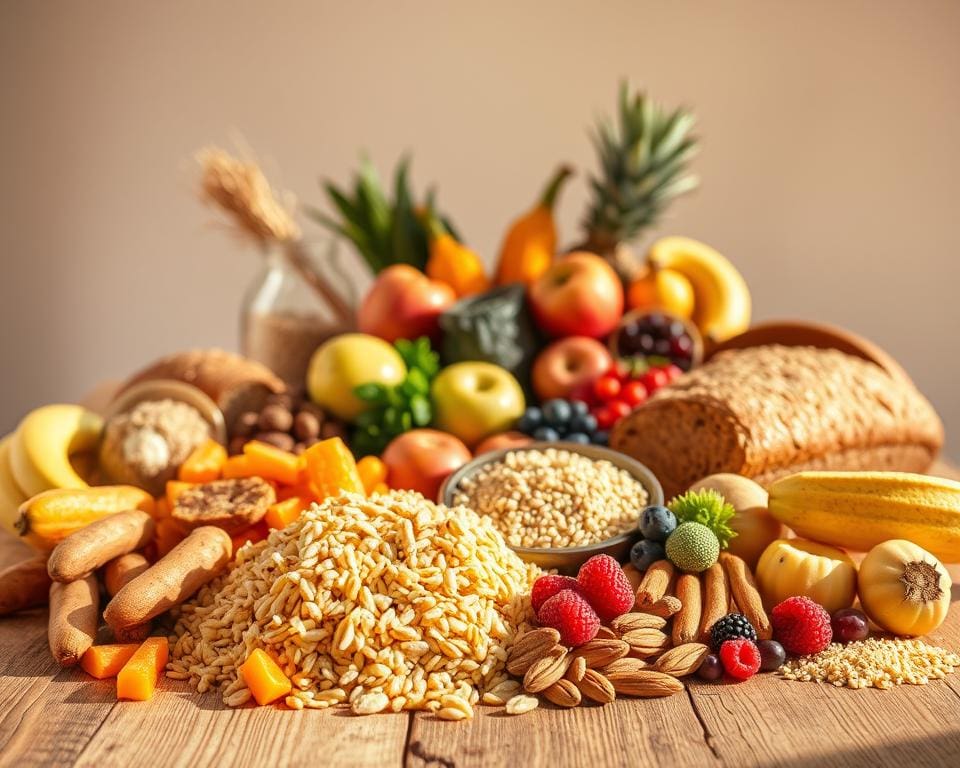Carbohydrates often take centre stage in discussions about nutrition, serving as a primary macronutrient essential for energy and overall well-being. In the realm of whole foods where carbohydrates are the dominant macronutrient, you’ll discover a wealth of sources that not only fuel your body but also promote optimal health. By focusing on healthy carbs in natural foods, one can make informed dietary choices that enhance vitality. This article invites you to explore a vibrant array of nourishing options, paving the way for a holistic approach to carbohydrate consumption.
Understanding Carbohydrates in Whole Foods
Carbohydrates play an essential role in our diets, serving as a primary source of energy. Understanding carbohydrates is crucial for making informed dietary choices. These macronutrients are divided into two main types: simple and complex. Simple carbohydrates, found in foods like fruits and sugars, provide quick energy, whereas complex carbohydrates, present in whole grains and legumes, offer sustained energy and nutritional benefits.
The impact of these carbohydrates on blood sugar levels varies significantly. Simple carbohydrates can lead to rapid increases in glucose, whereas complex carbohydrates help maintain steady blood sugar, promoting overall health. For optimal energy production, whole food carbohydrates for energy are preferable to their refined counterparts, which often lack vital nutrients.
Research supports the idea that consuming whole food sources can lead to better health outcomes. Whole foods retain their natural fibre, vitamins, and minerals, making them a wiser choice. By focusing on whole food carbohydrates, one can enjoy the benefits of balanced energy levels and improved overall well-being.

Whole Foods Where Carbohydrates Are The Dominant Macronutrient
Understanding the foundation of a balanced diet involves recognising the importance of dominant macronutrients, which include carbohydrates, proteins, and fats. Among these, carbohydrates stand out as a primary source of energy, especially when derived from whole foods. They play a critical role in sustaining physical activities and supporting cognitive functions. Nutritionists recommend that a substantial percentage of daily caloric intake, typically between 45% to 65%, should come from carbohydrates, particularly the best carbohydrate-rich foods.
Defining Dominant Macronutrients
Dominant macronutrients refer to the three major nutrients that provide energy and are crucial for the body’s overall functioning. Carbohydrates are the most advantageous macronutrient for many individuals, providing the quick energy required for daily tasks and exercise. Whole foods, such as fruits, vegetables, and grains, offer these vital carbohydrates in their most effective form, allowing the body to utilise them efficiently.
The Role of Carbohydrates in Nutrition
The role of carbohydrates in nutrition extends beyond merely being an energy source. They are essential for various bodily functions, including brain health and muscle performance. Complex carbohydrates, found in whole grains and legumes, supply sustained energy and essential nutrients. Incorporating these foods into meals optimises health and maximises the benefits of a carbohydrate-rich diet.
Benefits of Carbohydrates from Whole Foods
Carbohydrates form an integral part of a well-balanced diet, especially when sourced from whole foods. The benefits of carbohydrates go beyond mere nourishment; they play a crucial role in energy production and enhancing overall performance. Understanding the types of carbohydrates can guide dietary choices and optimise health.
Energy Production and Performance
Whole food carbohydrates are pivotal for energy production. They serve as the body’s primary fuel source, enabling individuals to engage in physical activities and maintain mental clarity throughout the day. Consuming carbohydrates from whole foods like fruits, vegetables, and whole grains promotes sustained energy release, making them essential for athletes and those with active lifestyles.
Complex Carbohydrates vs. Simple Carbohydrates
When discussing the benefits of carbohydrates, one must distinguish between complex carbohydrates and simple carbohydrates. Complex carbohydrates, found in foods such as whole grains and legumes, provide a steady energy release. In contrast, simple carbohydrates, present in sugary snacks and beverages, offer quick bursts of energy but can lead to energy crashes.
Incorporating complex carbohydrates into daily meals optimises physical performance and supports cognitive function, allowing individuals to achieve their best both mentally and physically.
Best Carbohydrate-Rich Foods for Your Diet
Identifying the best carbohydrate-rich foods enhances your dietary choices, providing essential energy and nutrients. Incorporating a variety of fruits and vegetables and whole grains is vital in achieving a balanced diet. These foods not only meet carbohydrate needs but also deliver a range of health benefits.
Fruits and Vegetables Packed with Carbohydrates
Fruits and vegetables serve as a vibrant source of carbohydrates, especially those rich in natural sugars and starches. Some notable options include:
- Bananas – A convenient snack that offers quick energy.
- Apples – High in fibre, making them a satisfying choice.
- Berries – Packed with antioxidants and low in calories.
- Carrots – A crunchy root vegetable full of vitamins.
- Beets – Naturally sweet and great for stamina.
Whole Grains as a Top Carb Source
When it comes to whole grains, selecting the right options maximises health benefits. The following whole grains stand out as excellent carbohydrate sources:
- Brown rice – A versatile grain filled with fibre and nutrients.
- Barley – A unique grain that supports heart health.
- Whole-wheat pasta – A satisfying alternative that keeps you full.
High Carb Whole Food Options for Energy
Legumes stand out as some of the best high carb whole food options available. With their impressive nutritional profile, they serve as fantastic energy sources that not only fuel the body but also provide essential proteins and dietary fibres. Incorporating these foods into your diet can lead to sustained energy levels throughout the day.
Exploring Legumes as Energy Sources
Legumes such as lentils, chickpeas, and black beans pack a powerful punch when it comes to energy and nutrition. Rich in complex carbohydrates, they break down slowly in the body, ensuring a steady release of energy. This quality makes them ideal for those seeking to enhance their dietary quality and maintain consistent energy levels.
- Lentils: A versatile choice, perfect for soups, salads, or as a side dish.
- Chickpeas: Great for hummus, salads, or roasted for a snack.
- Black Beans: Excellent in tacos, burritos, or as a base for a nutritious bowl.
Preparing legumes is simple. Many can be cooked in bulk and stored for easy meal options throughout the week, making these high carb whole food options convenient for busy lifestyles. By creatively incorporating legumes into your meals, you can enhance not just energy levels but also overall health.
Top Carb Sources in Whole Foods: A Detailed Review
Exploring the top carb sources in whole foods provides a wealth of options for those seeking nutritious and energising dietary choices. Among the most noteworthy are potatoes, quinoa, oats, and sweet potatoes. Each of these foods offers distinct health benefits and serves as versatile staples in various culinary applications.
Integrating Potatoes, Quinoa, and Oats
Potatoes rank as one of the most popular carbohydrate sources worldwide, known for their comforting and satisfying nature. They are rich in vitamins, minerals, and fibre, contributing to a balanced diet. Quinoa, often hailed as a superfood, boasts a complete protein profile, making it an excellent choice for vegetarians and vegans. It serves as a remarkable alternative to traditional grains, providing several essential nutrients with a lower glycaemic index.
Oats are another fantastic option, packed with soluble fibre that aids in cholesterol management and promotes heart health. Incorporating oats into breakfast can lead to a sustained release of energy, leaving individuals feeling satiated and ready to tackle the day ahead.
The Nutritional Power of Sweet Potatoes
Sweet potatoes stand out among the top carb sources in whole foods, not only for their sweetness but also for their impressive nutritional profile. They are high in beta-carotene, which the body converts into vitamin A, supporting overall health. The lower glycaemic index of sweet potatoes makes them especially attractive for those looking for a steady energy release. Their versatility allows for various preparation methods, from roasting to mashing, providing ample opportunities to incorporate them into meals.
Healthy Carbs in Natural Foods
Healthy carbs in natural foods play a vital role in maintaining a balanced diet. Whole foods such as fruits, vegetables, whole grains, and legumes provide a wealth of carbohydrates that are essential for energy and overall well-being. Unlike processed options, these natural sources of good carbs are free from added sugars and unhealthy fats, making them ideal for nourishing the body.
Incorporating healthy carbs from natural foods is beneficial for various reasons. Fruits, such as bananas and apples, offer natural sweetness along with vitamins and minerals. Similarly, whole grains like brown rice and quinoa serve as excellent sources of energy and fibre, supporting digestive health and helping to sustain energy levels throughout the day.
It is a common myth that carbohydrates contribute to weight gain. When derived from wholesome food sources, healthy carbs can facilitate weight management. Their high fibre content not only promotes feelings of fullness but also aids in maintaining a balanced blood sugar level.
Legumes, including lentils and chickpeas, further exemplify healthy carbs in natural foods, providing protein along with complex carbohydrates. By choosing these nutrient-dense options, individuals can enjoy the benefits of a diet rich in natural sources of good carbs without the guilt associated with other carbohydrate sources.
Whole Food Sources of Complex Carbs
Complex carbohydrates play a vital role in maintaining a balanced diet. Unlike their simple counterparts, complex carbohydrates offer sustained energy and are often rich in essential nutrients. Whole food sources of complex carbs, such as whole grains, legumes, and starchy vegetables, provide a wealth of fibre, promoting digestive health and enhancing satiety. Choosing these foods can effectively regulate blood sugar levels, making them a crucial part of any healthy eating plan.
Why Choose Complex Carbohydrates?
Opting for complex carbohydrates is beneficial for various reasons. These carbohydrates digest more slowly than simple ones, leading to a gradual release of glucose into the bloodstream. This steady supply of energy helps to maintain consistent energy levels throughout the day. Including whole food sources of complex carbs in your diet can also support long-term health by reducing the risk of chronic diseases, including diabetes and heart disease. Foods rich in complex carbohydrates are often high in vitamins and minerals, further enhancing their nutritional value.
Incorporating Nuts and Seeds into Your Diet
Nuts and seeds serve as excellent complements to a diet rich in complex carbohydrates. These wholesome foods provide not only healthy fats but also a variety of micronutrients that further nourish the body. Adding nuts and seeds such as almonds, chia seeds, or flaxseeds to your meals can enhance flavour while increasing the overall health benefits. Sprinkling a handful over salads, blending them into smoothies, or incorporating them into baking can make it simple to include these nutrient powerhouses in your meals.
Fibre-Rich Whole Food Carbs for Digestive Health
A diet abundant in fibre-rich whole food carbs is paramount for maintaining excellent digestive health. Foods such as whole grains, legumes, fruits, and vegetables are not just sources of essential nutrients but are also vital for enhancing gut function. These fibre-rich options support efficient digestion and promote regular bowel movements, helping to alleviate issues such as constipation. With their natural composition, whole food carbs play a significant role in keeping the digestive tract healthy.
Research consistently highlights the importance of dietary fibre in reducing the risk of digestive problems. Whole grains like oats and brown rice, alongside legumes such as lentils and chickpeas, can dramatically improve overall gut health. By incorporating these fibre-rich whole food carbs into your meals, you empower your body to perform optimally, reaping the benefits of enhanced digestive efficiency and well-being.
The impact of fibre on digestive health cannot be overstated. Consuming a variety of fibre-rich whole food carbs not only promotes regularity but also supports the growth of beneficial gut bacteria. A well-balanced diet enriched with fruits, vegetables, and whole grains brings about holistic wellness and revitalises your digestive system, making each meal an opportunity to invest in your health.









